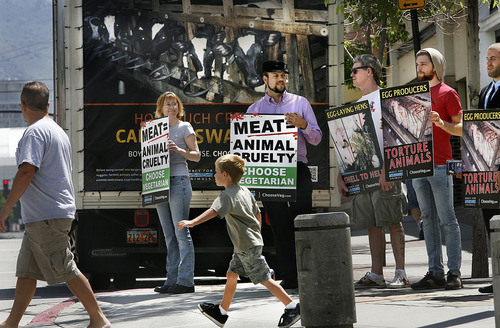This is an archived article that was published on sltrib.com in 2011, and information in the article may be outdated. It is provided only for personal research purposes and may not be reprinted.
Salt Lake City's Gateway shopping district was the final stop of an animal rights group's coast-to-coast road show to expose factory farm practices and sway consumers to a vegetarian diet.
The three-month tour through 42 cities was meant "to expose the hidden price of meat, dairy and egg production, which is egregious cruelty to animals," Phil Letten, a Mercy for Animals spokesman, said on Saturday.
Letten and partner Victor Sjodin had staked out the southeast corner of 100 South and Rio Grande Street, where they and a handful of Utah volunteers carried placards and handed out leaflets and copies of "Farm to Fridge," a 12-minute video about brutality they say animals regularly suffer on factory farms.
"Most people care about animals. They just have no idea that farmed animals are forced to endure such egregious cruelty throughout their lives," Letten said.
Letten and Sjodin arrived in Salt Lake City in a specially modified truck carrying three 80-inch video screens to show the "Farm to Fridge" video on Saturday night.
Shoppers showed little interest in the handouts — one passer-by refused Sjodin's leaflet, saying, "No, man. Bacon is [expletive] good."
Ranchers, too, think the Mercy for Animals' message is overblown.
"Most of our cattle live on open pastures and rangelands," said Brent Tanner, executive vice president of the Utah Cattlemen's Association.
"We encourage ranchers to follow beef quality-assurance guidelines that emphasize the humane treatment of cattle. We never condone the abuse of animals," Tanner said in an email.
Even so, Letten said the message is getting out. The video has been viewed almost 3 million times on the Internet. He and Sjodin think they've spoken directly to "hundreds, if not thousands" of people since their tour kicked off in Las Vegas on March 7.
While few safeguards exist for farmed animals, Letten said, the message of Mercy for Animals is not that lawmakers should pass laws to protect them from heartless husbandry practices. Instead, the nonprofit organization puts the onus of sticking up for animals on consumers.
"We definitely support any laws protecting animals from cruel and inhumane treatment,"Letten said.
"However, the most powerful action consumers can take to prevent cruelty to animals is to adopt a compassionate vegetarian diet," he said.
That message resonates with Peggy Edwards, a vegetarian who drove from Provo to The Gateway to carry a sign for Mercy for Animals. She says it's easy and inexpensive to eschew meat.
"There's a lot of meat alternatives out there, and you really don't feel like you're missing anything by it," Edwards said.
A vegetarian for three years, Edwards said the health benefits of a meat-free diet are straightforward.
"When I went to my last doctor's exam, I floored my nurse with my blood pressure and cholesterol levels," she said.
Twitter: @SLTribPaul To see 'Farm to Fridge'
Mercy For Animals has posted the video, which contains graphic content, online at bit.ly/ePJcOM.



